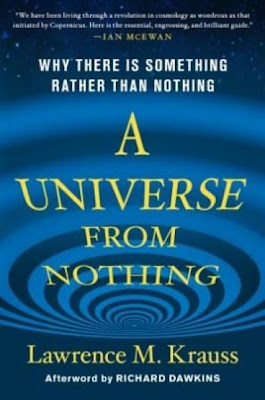As hurricane Sandy ravaged New York City and the rest of the North East, it was an ideal time to hunker down and finish the latest book I was reading. While nature wreaked havoc all around, coupled with the contents of the book, it was obvious yet again that reality is much more awe inspiring than fairytale.
Lawrence Krauss is one of the leading names in cosmology and theoretical physics, and is the director of the Origins Project at Arizona State University. He has written a number of popular science books.
A Universe From Nothing gives an account of the latest findings in cosmology, and attempts to bring some light as to why there is something rather than nothing. It turns out that there is a lot going on in "nothing", and it has nothing to do with the supernatural. We are told about the breakthroughs of science over the course of the last century and more, right up to the knowledge of matter and anti-matter particles popping in and out of existence within empty space.
It's an invigorating subject, and the book was spawned from the popularity of a lecture that Krauss did back in 2009, which has had over 1.6 million youtube hits at the time of writing.
The original lecture is below and well worth your time.
Krauss' style is sharp, incredibly witty and filled with humour but perhaps most distinctly, very quick-fire. This style is also prominent in the book, and in terms of being quick-fire, perhaps to its detriment. I found myself struggling to keep up with the content somewhat and this is either my fault for simply failing to grasp some of the information, Krauss' fault for not explaining them well enough, or the fact that the subject matters are simply quite difficult in the first place! Perhaps the book needed to be longer than just under 200-pages to flesh out all the ins and outs. However, despite sometimes being hard to follow, the overall picture is clear, reality is the way that it is and not the way we would like it to be.
I had the pleasure of seeing one of his lectures earlier this year at the Hayden planetarium, where I also purchased the book. Krauss is a fantastic public speaker, thoroughly engaging and funny, and aided by various slides, was much more digestible than the book. The lecture was similar to the one posted above, but updated a little more, including indulging in some of the backpedaling that theologians and philosophers have had to go through as we start to know more about what nothing is. If you ever get the chance to see him lecture, do so.
Christopher Hitchens was going to write the foreword for the book, but had to stop when he became too sick, apparently he was about halfway done. I spoke to Professor Krauss about Hitch after the event and you could sense their friendship and admiration he had for him.
In Christopher's absence, Richard Dawkins wrote the afterword and gives the book a ringing endorsement, perhaps overly enthusiastic, but nobody writes better than Dawkins when trying to highlight the virtues and inspiration of science.
I also managed to meet Neil DeGrasse Tyson, who introduced the lecture and stayed around afterwards. It took me about an hour to meet him as other people muscled in ahead (I think I'm just too nice to do that...), but it was a thrill to hear him debate with various people who had somewhat deluded views... it's amazing to see so many people appear to be disappointed that the world is not going to end in the near future through a variety of reasons (Mayan calendar, giant asteroid, etc, etc). One person even said to him "Genesis is mostly true...", I applaud Neil's patience as he must have heard all of these things before, but seems to treat each occasion with a feverish enthusiasm for the virtues of science.
Overall, I would say the book is a good read, but I couldn't help but feel that I was missing something. One of religions last cards is "why is there something rather than nothing?", but we are very close to having a plausible scientific explanation for just that cowardly fallback into the unknown that theologians cling to (even though in the highly unlikely event there is a god, it's even more unlikely it's the god as described by any of the worlds religions...).
The book perhaps does not answer what "nothing" is to the satisfaction of all, because people can reframe what "nothing" is to fit their own agendas, the book is upfront about what notions of "nothing" are being dealt with, and given the advances of the last hundred years, perhaps even experts at obfuscation will ultimately be left dumbfounded in the future.


